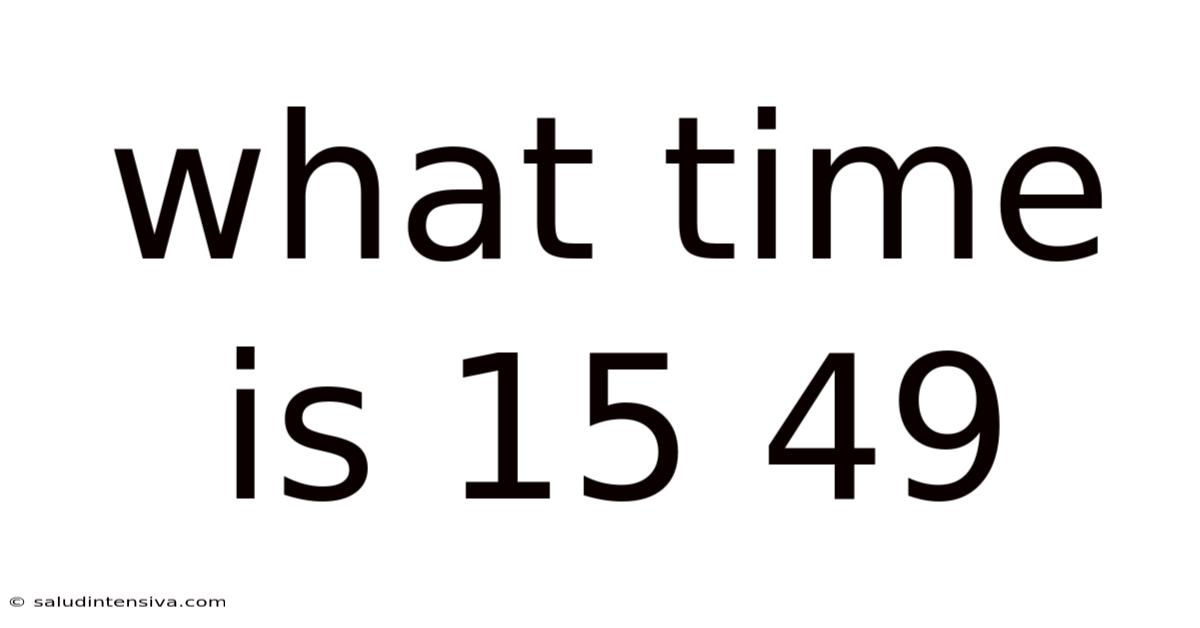What Time Is 15 49
saludintensiva
Sep 09, 2025 · 4 min read

Table of Contents
What Time is 15:49? Understanding the 24-Hour Clock and Time Conversions
The question "What time is 15:49?" might seem simple at first glance, but it opens the door to a broader understanding of timekeeping systems, particularly the 24-hour clock, also known as military time. This article will not only answer the question directly but will also delve into the intricacies of time conversion, explore the reasons behind using the 24-hour clock, and address common misconceptions surrounding time notation.
Introduction: The Mystery of 15:49
The notation "15:49" represents a time using the 24-hour clock system. Unlike the 12-hour clock, which uses AM and PM to differentiate between morning and afternoon/evening, the 24-hour clock uses a continuous sequence from 00:00 (midnight) to 23:59 (one minute before midnight). Therefore, understanding 15:49 requires understanding this system and how to convert it to the more familiar 12-hour clock format.
Understanding the 24-Hour Clock (Military Time)
The 24-hour clock, also known as military time, offers several advantages over the 12-hour system. Primarily, it removes any ambiguity associated with AM and PM. There's no need to specify whether 7:00 refers to 7 AM or 7 PM; in the 24-hour system, 7:00 is 7 AM, while 19:00 is 7 PM. This unambiguous nature is crucial in various contexts, such as scheduling, transportation, and military operations where precision is paramount.
Here's a breakdown of how the 24-hour clock works:
- Midnight: 00:00
- 1 AM: 01:00
- 2 AM: 02:00
- ...and so on until...
- 12 PM (Noon): 12:00
- 1 PM: 13:00
- 2 PM: 14:00
- 3 PM: 15:00
- 4 PM: 16:00
- ...and so on until...
- 11 PM: 23:00
Notice that the hours from 1 PM to 11 PM are simply 12 added to the corresponding 12-hour clock time.
Converting 15:49 to the 12-Hour Clock
Now, let's address the specific question: What time is 15:49?
Since 15 in the 24-hour system corresponds to 3 PM in the 12-hour system, 15:49 is 3:49 PM.
The Importance of Precision in Timekeeping
The adoption of the 24-hour clock highlights the importance of precise timekeeping in various professions and everyday life. Consider these examples:
- Aviation: In air traffic control, precise timing is essential for preventing collisions and ensuring the smooth flow of air traffic. Ambiguity is unacceptable.
- Medicine: In hospitals, precise timing of medication administration is critical for patient safety and effective treatment.
- Transportation: Train schedules, bus routes, and flight itineraries often utilize the 24-hour clock to avoid confusion.
- International Communication: The 24-hour clock is widely used internationally to facilitate clear communication across time zones.
Time Zones and Their Impact on Time Interpretation
It's crucial to remember that the time displayed (like 15:49) is always relative to a specific time zone. If someone in London states that the time is 15:49, this is not the same time in New York or Tokyo. Understanding time zones requires considering the differences in longitude and the Earth's rotation. Each time zone is typically offset from Coordinated Universal Time (UTC), formerly known as Greenwich Mean Time (GMT).
Frequently Asked Questions (FAQs)
- Q: Why is the 24-hour clock also called military time?
A: The 24-hour clock gained prominence in military settings due to its clarity and precision, minimizing the risk of miscommunication that could have dire consequences.
- Q: Is the 24-hour clock used everywhere?
A: No. While the 24-hour clock is widely used in many parts of the world, particularly in Europe and parts of Asia, the 12-hour clock remains prevalent in other regions, like North America.
- Q: How do I convert from 12-hour time to 24-hour time?
A: For times in the AM, the 12-hour time is the same in 24-hour format (except for 12:00 AM which is 00:00). For times in the PM, add 12 to the hour (unless it's 12 PM, which stays 12:00). For example, 8:30 AM is 08:30, and 8:30 PM is 20:30.
- Q: Are there any other timekeeping systems?
A: Yes, historically, various cultures have utilized different timekeeping systems. However, the 12-hour and 24-hour clocks are the most widely used in the modern world.
Conclusion: Mastering Time and its Representations
The seemingly simple question "What time is 15:49?" unveils the fascinating world of timekeeping systems and their practical applications. By understanding the 24-hour clock and its conversion to the 12-hour clock, we gain a greater appreciation for the precision required in various aspects of modern life. Mastering these systems allows for clearer communication, reduced ambiguity, and enhanced efficiency across diverse fields. The next time you encounter a time expressed in the 24-hour format, you'll be well-equipped to understand and interpret it accurately. The understanding of different time systems goes beyond simply telling time; it represents a mastery of basic numeracy and global communication. Remember, precision in timekeeping isn't just about knowing the hour; it's about understanding the context and the implications of that time in various parts of the world.
Latest Posts
Latest Posts
-
Gcf Of 40 And 36
Sep 09, 2025
-
Lcm Of 28 And 42
Sep 09, 2025
-
2 To The Fifth Power
Sep 09, 2025
-
Equivalent Fraction For 7 9
Sep 09, 2025
-
3 3 8 In Decimal Form
Sep 09, 2025
Related Post
Thank you for visiting our website which covers about What Time Is 15 49 . We hope the information provided has been useful to you. Feel free to contact us if you have any questions or need further assistance. See you next time and don't miss to bookmark.